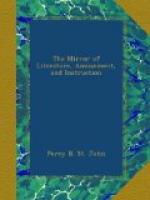From Brand’s “History of Newcastle,” we find that there was a branch of the fraternity in that place; as at a meeting, 1742, of the barber-chirurgeons, it was ordered, that they should not shave on a Sunday, and “that no brother shave John Robinson, till he pay what he owes to Robert Shafto.” Speaking of the “grosse ignorance of the barbers,” a facetious author says, “This puts me in minde of a barber who, after he had cupped me, (as the physitian had prescribed,) to turn a catarrhe, asked me if I would be sacrificed. Scarified? said I; did the physitian tell you any such thing? No, (quoth he,) but I have sacrificed many, who have been the better for it. Then musing a little with myselfe, I told him, Surely, sir, you mistake yourself—you meane scarified. O, sir, by your favour, (quoth he,) I have ever heard it called sacrificing; and as for scarifying, I never heard of it before. In a word, I could by no means perswade him but that it was the barber’s office to sacrifice men. Since which time I never saw any man in a barber’s hands, but that sacrificing barber came to my mind.”—Wadd’s Nugae.
* * * * *
Sir Theodore Mayerne may be considered one of the earliest reformers of the practice of physic. He left some papers written in elegant Latin, in the Ashmolean Collection, which contain many curious particulars relative to the first invention of several medicines, and the state of physic at that period. Petitot, the celebrated enameller, owed his success in colouring to some chemical secrets communicated to him by Sir Theodore.
He was a voluminous writer, and, among others, wrote a book of receipts in cookery. Many were the good and savoury things invented by Sir Theodore; his maxims, and those of Sir John Hill, under the cloak of Mrs. Glasse, might have directed our stew-pans to this hour, but for the more scientific instructions of the renowned Mrs. Rundall, or of the still more scientific Dr. Kitchiner, who has verified the old adage, that the “Kitchen is the handmaid to Physic;” and if it be true that we are to regard a “good cook as in the nature of a good physician,” then is Dr. Kitchiner the best physician that ever condescended to treat “de re culinaria.”
Sir Theodore may, in a degree, be said to have fallen a victim to bad cookery; for he is reported to have died of the effects of bad wine, which he drank at a tavern in the Strand. He foretold it would be fatal, and died, as it were, out of compliment to his own prediction.—Ibid.
* * * * *
THE SELECTOR, AND LITERARY NOTICES OF NEW WORKS.
* * * * *
THE COFFEE-DRINKER’S MANUAL.
We would say of coffee-making in England, as Hamlet did of acting, “Oh, reform it altogether.” Accordingly, the publication of a pleasant trifle, under the above name, is not ill-timed. Like all our modern farces, it is from the French, and as the translator informs us, the editor of the original is “of the Cafe de Foi, at Paris.”




